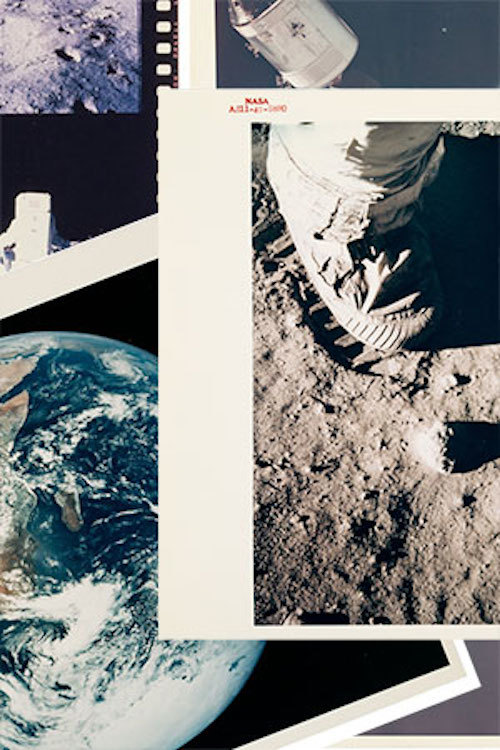10.09.2021

Heritage Auctions' "Images of Apollo: The J.L. Pickering Collection" signature auction runs through Sept. 24, 2021. (Heritage Auctions)
A private archivist known for unearthing rare images from the early years of human spaceflight is now selling a treasure trove of NASA prints representing some of the most iconic photos ever taken.
J.L. Pickering has dedicated the past 50 years to researching the visual history of space exploration and, in the process, has amassed a collection of more than 150,000 photo prints. Heritage Auctions on Tuesday (Sept. 7) began accepting bids on a few hundred of Pickering's pieces, focusing on the "Images of Apollo."
"The vintage prints I am selling in the auction are becoming harder and harder for collectors to find, but the images themselves are not rare," Pickering wrote in an email to collectSPACE.
The Images of Apollo: The J.L. Pickering Collection auction, which concludes on Sept. 24, features more than 300 photos and film strips from the span of NASA's first human missions to the moon. From the sight of Apollo 7 in Earth orbit to the last humans (to date) walking on the moon during the Apollo 17 mission, the sale centers on the images that documented humanity's greatest adventure.
"We are incredibly excited to offer such an extensive collection of these iconic images," Brad Palmer, consignment director and cataloger for Heritage's space exploration department, said in a statement. "Our recent auctions have shown that collectors are fascinated with these vintage prints and this is a wonderful opportunity to acquire them in some of the best conditions we have seen."
When the Apollo astronauts splashed down on Earth, their exposed film rolls were delivered to the Manned Spacecraft Center (today, Johnson Space Center) in Houston. The delicate and irreplaceable flown film was used to produce a set of duplicate internegatives and then was placed into cold storage for preservation. The duplicates were then used to produce additional copies, from which the first photo prints were made.
NASA assigned each photo a serial number, which was often printed with the photograph on Kodak fiber-based paper (bearing the "A Kodak Paper" watermark on the reverse). The ID numbers were commonly printed in red ink, leading to collectors referring to the now vintage NASA photo prints as "red number" photos. (Other prints of similar vintage used black and blue ink, but the red-inked prints have drawn the most collector interest.)
The glossy prints were distributed to members of the press, to NASA employees and contractors and to the public on request. Although plentiful in their day, the prints have become more difficult to find in their original condition as the decades have passed.
"Pickering is well known as an expert in the field, and he has offered these directly from his collection," said Palmer. "Whether a veteran collector looking for specific images or someone just at the outset of their collection, there are opportunities for all."
All of the prints and film rolls have a starting bid of $1. Early bidding has already driven some of the lots into the hundreds, if not higher. A NASA print of Apollo 11 astronaut Buzz Aldrin standing on the moon with photographer Neil Armstrong reflected in his visor was leading the 360 lots at more than $1,000 as of Tuesday evening.
Another red number print, that of "Earthrise" as seen by the Apollo 8 crew in orbit around the moon, was selling for more than $600.
In addition to the prints and film rolls, Pickering is also selling the press proofs from his first two photo books written with John Bisney, "Spaceshots and Snapshots of Projects Mercury and Gemini" and "Moonshots and Snapshots of Project Apollo" (University of New Mexico Press, 2015). Pickering and Bisney's latest title, "Picturing the Space Shuttle: The Early Years" was released Tuesday by University of Florida Press.
Pickering's archive has been a source of imagery for CNN and the Discovery Channel, museum curators, historians and even astronauts. Now, he is sharing part of his collection with collectors around the world.
"These 300 prints barely put a dent in my overall collection. Some are duplicates, but most are photos I felt I could part with," Pickering told collectSPACE. "I have owned these prints for over 35 years. The time just seems right."
Quelle: CS
